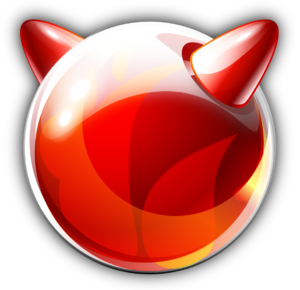We are still actively working on the spam issue.
Difference between revisions of "FreeBSD"
m (Added category) |
Shiny Rice (talk | contribs) |
||
| Line 1: | Line 1: | ||
[[File:Freebsd.png|thumb|FreeBSD logo]] | [[File:Freebsd.png|thumb|FreeBSD logo]] | ||
| − | '''FreeBSD''' is a free and open-source software operating system. It is based on Unix, as opposed to merely being a clone in the vein of [[GNU/Linux]]. It has a relatively small (in comparison to GNU/Linux) but loyal userbase, many of whom are fiercely loyal to the traditional 'Unix Way'. | + | '''FreeBSD''' is a free and open-source software operating system. It is based on Unix, as opposed to merely being a clone in the vein of [[GNU/Linux]]. It has a relatively small (in comparison to GNU/Linux) but loyal userbase, many of whom are fiercely loyal to the traditional 'Unix Way'. But if its derivatives are taken into account, it holds the largest userbase of all open-source operating systems that are directly derived from Unix. |
| − | FreeBSD | + | Although not comparable directly to a GNU/Linux distribution - by virtue of FreeBSD '''not''' being a distribution (all of the base system is developed in a single tree rather than aggregated from elsewhere) - it shares a lot of similarities with [[Arch]] and [[Gentoo]]. Both Arch and Gentoo, for instance, have package management systems inspired by FreeBSD's Ports Tree - the (optional) Arch Build System, and Portage, respectively. |
| − | + | == Licensing == | |
| + | FreeBSD is licensed under the permissive BSD license, which, unlike the copyleft GPL, allows modification and repackaging of the software into commercial derivatives, and other actions not under GPL. This has made FreeBSD the choice of many corporations when putting together hundreds of servers (Whatsapp and Netflix use it), enabled Sony to use it in their most recent consoles, and spawned many derivatives. | ||
| + | |||
| + | == Derivatives == | ||
| + | FreeBSD powers a good amount of software, like the popular [[NAS]] programs FreeNAS and NAS4Free, the PlayStation 4's OS, [[OS X]] from [[Apple]], and JUNOS from Juniper Networks, it has achieved a strong presence, if indirectly, on the desktop and on routers. | ||
[[Category:BSD]] | [[Category:BSD]] | ||
[[Category:Software]] | [[Category:Software]] | ||
[[Category:Operating systems]] | [[Category:Operating systems]] | ||
Revision as of 11:56, 8 August 2017
FreeBSD is a free and open-source software operating system. It is based on Unix, as opposed to merely being a clone in the vein of GNU/Linux. It has a relatively small (in comparison to GNU/Linux) but loyal userbase, many of whom are fiercely loyal to the traditional 'Unix Way'. But if its derivatives are taken into account, it holds the largest userbase of all open-source operating systems that are directly derived from Unix.
Although not comparable directly to a GNU/Linux distribution - by virtue of FreeBSD not being a distribution (all of the base system is developed in a single tree rather than aggregated from elsewhere) - it shares a lot of similarities with Arch and Gentoo. Both Arch and Gentoo, for instance, have package management systems inspired by FreeBSD's Ports Tree - the (optional) Arch Build System, and Portage, respectively.
Licensing
FreeBSD is licensed under the permissive BSD license, which, unlike the copyleft GPL, allows modification and repackaging of the software into commercial derivatives, and other actions not under GPL. This has made FreeBSD the choice of many corporations when putting together hundreds of servers (Whatsapp and Netflix use it), enabled Sony to use it in their most recent consoles, and spawned many derivatives.
Derivatives
FreeBSD powers a good amount of software, like the popular NAS programs FreeNAS and NAS4Free, the PlayStation 4's OS, OS X from Apple, and JUNOS from Juniper Networks, it has achieved a strong presence, if indirectly, on the desktop and on routers.
